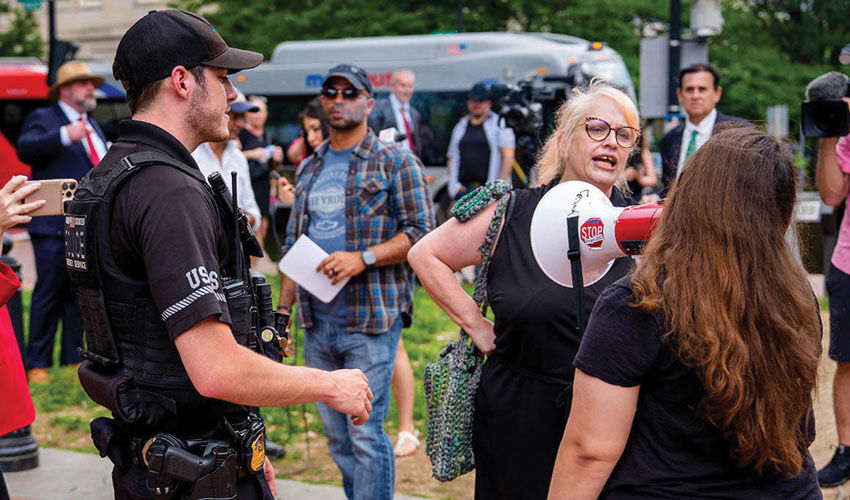
Unfortunately, I was not surprised. A few days earlier, former Proud Boys leader Enrique Tarrio and other rebels who were pardoned by President Donald Trump for crimes related to the January 6, 2021 attack on the U.S. Capitol were lauded as heroes at the Conservative Political Action Conference (CPAC), the main gathering of Trump’s Make America Great Again (MAGA) movement. One of them even boasted there, “We are like gods.”
As an anthropologist who studies political violence, I see these events as a sign that the U.S. is in serious trouble. In the 2021 bookIt Could Happen Here, I wrote that when malicious people begin to feel powerful, the risk of politically motivated violence increases. That threat became even clearer on June 14, when Vance Bolter, a Trump supporter, shot two Democratic lawmakers in Minnesota and their spouses, killing state House Speaker Melissa Hortman and her husband. Authorities later found a list with the names of 45 Democratic politicians in Bolter’s car.
This spike in political violence is due to four key factors. First, while Trump calls himself the president of “law and order,” he has fostered a culture of impunity. It’s not just that he’s a convicted felon with three remaining criminal cases that were either dismissed or suspended after his re-election. Long before all this, he made the famous statement, “I could stand in the middle of Fifth Avenue and shoot somebody and I wouldn’t lose a single voter.”
The second factor is previous acts of political violence that increase the risk of future violence. As I explain in It Could Happen Here, the U.S. has a long history of political violence from which certain conclusions can be drawn. However, even recent events provide ample cause for alarm.
The main blame lies with Trump. Before the January 6 insurgency, he challenged the integrity of the election and openly ordered the Proud Boys (and by extension the rest of the far-right extremists) to “standby.” Like other pundits at the time, I warned that the risk of violence in the U.S. was very high. While the October 7, 2020 arrest of members of a group planning to kidnap Michigan Governor Gretchen Whitmer and the January 6 attack on the Capitol were full of drama, they were not unexpected.
As the 2024 election approaches, the threat of violence has increased again. Trump himself was nearly killed at a July 13 rally in Pennsylvania, threats against election officials increased, and many feared that disputed election results would lead to another riot (but these fears lost significance after Trump’s victory).
Third, American society remains deeply divided. Having researched U.S. political culture, I know firsthand what polarization means, as people on both the left and the right often demonize the other side as authoritarian, presenting politics in an apocalyptic “it’s either us or them” way.
This data underscores how toxic and enduring polarization has become in the United States. Nearly half of Americans view those on the opposite side of the political spectrum as “unambiguously evil,” and an even higher proportion of Democrats and Republicans characterize each other as people who are “dishonest, immoral, and not willing to listen to a different opinion.” About 80% of American adults are concerned about political violence, and 40% believe the country is headed toward civil war.
Finally, the risk of political violence tends to increase during periods of turbulence, especially when the legitimacy of elections is challenged or when democratic institutions are weakened. Both conditions were met on the eve of the 2021 insurgency, and they are being met today.
Trump is campaigning aggressively to consolidate executive power. Since returning to the White House, he has sought to get rid of any limitations on presidential power, among them judicial independence, civil society, academic freedom, civil service neutrality, freedom of the press, and even basic civil liberties.
As a result, America has become a powder keg. When and where the next potential assassin might strike can only be guessed. But one thing is certain: the risk of political violence will increase before the 2026 midterm elections and may reach crisis levels before the 2028 presidential election.
There’s a simple way to reduce that risk: Trump can choose to unite rather than divide. Polls show that most Americans want to reduce political heat. Unfortunately, it is far more likely that Trump, who came to power on a populist platform of fears and resentments (largely racially colored), will continue to fan the fires of division, keeping the risk of political violence elevated.
Alex Hinton,
Professor of Anthropology, Director of the Center for the Study of Genocide and Human Rights (CGHR),
Director of UNESCO’s Genocide Prevention Program at Rutgers University.
© Project Syndicate, 2025.
www.project-syndicate.org

